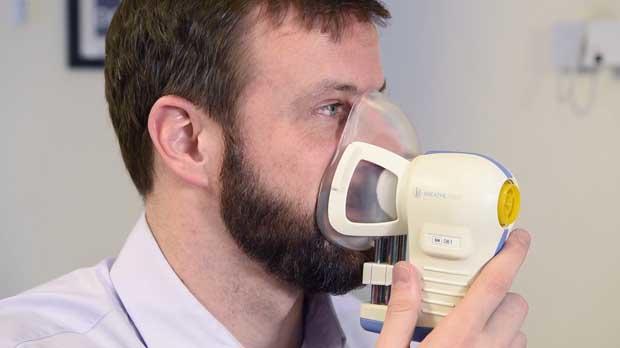Share this Page:
Cancer Research UK are pioneering a potential breath test for cancer. A clinical trial, being led by Professor Rebecca Fitzgerald, is about to start at the MRC Cancer Unit at the University of Cambridge. The trial is looking at ways to bring this potential cancer test into the clinic.
“The PAN trial is seeing if you can use a breath test device that detects volatile molecules from the breath to identify patients that might have an early cancer that they don’t know about,” says Fitzgerald. “This is a pilot study, so first we’re looking at a range of cancers to see if we get a signal and compare the signal to healthy individuals.”
The trial is being run in collaboration with Owlstone Medical, the manufacturer of the Breath Biopsy® technology, at Addenbrooke’s Hospital in Cambridge. The Breath Biopsy® picks up distinctive molecules released by cancer cells as they metabolise nutrients into energy for growth. The PAN trial is the first trial to look at whether this technology can pick up a range of cancers.
“Intuitively, lung cancer seems the most obvious cancer to be detected in the breath,” says Fitzgerald, adding that lung cancer breath studies using the Breath Biopsy® are already ongoing.
“But because of the way metabolites are recycled in the body, many other volatile molecules from other areas of the body end up in the breath too.”
The trial intends to collect and analyse the breath of 1,500 people to look for patterns, or ‘signatures’, in the breath molecules from people who are either healthy or who have suspected oesophageal, stomach, prostate, kidney, bladder, liver or pancreatic cancer. The trial aims to find out if there are differences between the ‘signatures’ from healthy people and people with cancer, and whether there are differences between cancer types, or just one ‘cancer signature’.
Read the Cancer Research UK press release here
Read about the PAN clinical trial on the Owlstone Medical website here














